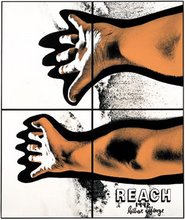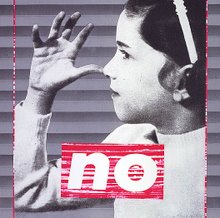You're gonna make it after all. Alright, this rant is going to make me sound whiny and bitter, but I don't care. Has anyone else noticed that damned annoying Chase commercial with the "cute" (i.e. dirty blonde, flat-chested and fugly) girl who gets her first pay check and runs around like Mary Tyler Moore with a worse wardrobe? She sticks it to her friends by buying them all lunch, she has a fabulous apartment, and she makes out with her generically good-looking boyfriend outside the movies.
I fucking hate her.
And, no, I didn't get the job, which is not as big a deal as it might seem because I have another interview Wednesday. I am just grumpy because work is boring and my brain falls asleep sitting in this damn office five hours a day. So, fine, I am a grump. But I am a hot grump.
Friday, September 30, 2005
Wednesday, September 28, 2005
Like whores, us all. It's not often that I disagree with Dan Savage...or ever, actually...but this time I gotta contradict his reasoning. He quotes E.J. Graff, currently the Brandeis Women's Studies Research Center resident scholar.
"Once upon a time, the West had a 'traditional' marriage philosophy." The husband owned his wife, whatever children she bore him—you know the drill. But capitalism eventually came along—thank God!—and freed us from those confining sex roles.
Actually, I believe Elizabeth Cady Stanton had a lot to do with this. But, you know, whatever.
"Each of us now has to make a living independently, based on individual talents and efforts rather than traditional roles. Over time, this led to gender equality in both the job market and the marriage market. Between 1850 and 1970, every developed country struck down its sex-based rules, both in labor (i.e., women can be plumbers and legislators) and in marriage (i.e., married women can own property, hold jobs without hubby's permission, have custody of children, and even—gasp!—say no in bed). The result: Gender equality is today's governing public philosophy, in marriage and in much else. For 150 years, courts and legislatures have changed marriage law to fit this philosophy, under which same-sex couples fit just fine."
For one thing, I don't know where this person got the whole "gender equality is today's governing public philosophy" line, because I must have missed that memo. In most states, and correct me if I'm wrong (and I mean correct me with legitimate statistics, not your opinion or something you read in Newsweek), it is not considered possible for a husband to rape his wife--or at least it's next to impossible to convict a husband for raping his wife. Women are still underrepresented in top jobs and payed less for the same work performed by their male coworkers. Women are often excluded from professions deemed masculine; it's still rare for a woman to be able to fight in the army in direct combat situations.
Furthermore, where did this notion of capitalism created equity between the sexes come from? Is this person completely rejecting years of Marxist Feminist philosophy--which I don't completely agree with, but it still makes some valid points? Did Graff completely miss the entire set of theory which discusses how the rise of capitalism and the subsequent separate spheres of influence completely voided the worth of what women contributed to family? Capitalism undervalues traditional women's work (e.g. child care and housework) because such work does not have a precise monetary value. So, I have to say, where in the heck did Graff come up with this? I could dig out my Women and Gender in America notes and continue, but I think I've made my point.
I should note that I was told by my WOST advisor that Brandeis has a suck Women's Studies department. Maybe that explains it.
Posted by
The Liz
at
5:47 PM
0
comments
![]()
Labels: Feminism
Don't wake me, I plan on sleeping in. I couldn't fall asleep last night, and I overslept today. Hovering somewhere between sleep and awake after hitting the snooze button for the sixth time, I had a sort of half dream. In the dream, a voice said something to the effect of, "I have have made bad choices and good choices, but it doesn't matter because I am making good choices now. I regret nothing."
What's going on in my subconscious?
Posted by
The Liz
at
10:31 AM
0
comments
![]()
Monday, September 26, 2005
I'm heaven sent.
From "Ten Years On" in The Alchemist, which never fails to make me cry:
We who fight for our dream, suffer far more when it doesn't work out, because we cannot fall back on the old excuse: "Oh, well, I didn't really want it anyway." We do want it and know that we have staked everything on it and that the path of the personal calling is no easier than any other path, except that our whole heart is in this journey. Then, we warriors of light must be prepared to have patience in difficult times and to know the Universe is conspiring in our favor, even though we may not understand how.
I ask myself: are defeats necessary?
Well, necessary or not, they happen. When we first begin fighting for our dream, we have no experience and make many mistakes. The secret of life, though, is to fall seven times and to get up eight times.
So, why is it so important to live our personal calling if we are only going to suffer more than other people?
Because, once we have overcome the defeats--and we always do--we are filled by a greater sense of euphoria and confidence....
If you believe yourself worthy of the thing you fought so hard to get, then you become an instrument of God, you help the Soul of the World, and you understand why you are here.
From The Alchemist, which defines it all:
There is one great truth on this planet: whoever you are, or whatever it is that you do, when you really want something, it's because that desire originated in the soul of the universe. It's your mission on earth....And when you want something, all the universe conspires in helping you to achieve it.
Posted by
The Liz
at
10:51 AM
0
comments
![]()
Sunday, September 25, 2005
So says I. There's a J-date billboard in Times Square. I couldn't stop laughing when I saw it. After I explained what the match-making site was to my dad, he said, "Oh, I was wondering why everyone had a big nose and was vaguely Semitic-looking."
Posted by
The Liz
at
12:55 PM
0
comments
![]()
Labels: Jew-ish
Friday, September 23, 2005
We were ment to be as one. Because of the events of the day, it is now time to pay tribute to my very own Wombat from Luxembourg.
He is a man who can cheer me up when I'm down:
Go for it girl u can get a wonderful job, since u are b-r-i-l-l-i-a-n-t!
A man who quotes Shakespeare to me on the value of our friendship:
Shakespeare Sonnet 116.
'Let me not the marriage of true minds admit impediments,
Love is not love which alters when it alteration finds,
Nor bends with the remover to remove...'
And, most importantly, a man who sends me pictures of his underwear so that I can help him impress the ladies.

For these reasons, and so many others, I salute my Raoul. Cheers!
Posted by
The Liz
at
3:41 PM
1 comments
![]()
Thursday, September 22, 2005
Une fleur m'inspire. I just got my photos from my family trip to France developed. Yes, this was a trip I took in June, and yes I am lazy and didn't get my photos developed until last week. Anyway, a few of them were really cool, and thanks to blogger's new feature where I can upload pictures to my blog from my computer without having to pay for the privilege, I can share them with you. You won't see any pictures of me (I learned my lesson about identifying information, thank you), but try to enjoy them anyway.
Here is some fabulous graffiti art I found in the Marais district in Paris. 
This is the view out of my kitchen window in Paris. My dad rented us a penthouse on Avenue Emile Zola. That's right, I got to stare at the Tour Eiffel all day and all night. I even kept the curtains open while I showered so I could watch the light show (thank goodness for high windows).
Posted by
The Liz
at
3:42 PM
0
comments
![]()
Tuesday, September 20, 2005
That's not petty. Can you say fundraising genius? Let's raise money off the crazy mofos!
Here's how it works: You decide on the amount you would like to pledge for each protester (minimum 10 cents). When protesters show up on our sidewalks, Planned Parenthood Southeastern Pennsylvania will count and record their number each day from October 1 through November 30, 2005. We will place a signoutside the health center that tracks pledges and makes protesters fully aware that their actions are benefiting PPSP. At the end of the two-month campaign, we will send you an update on protest activities and a pledge reminder.
Posted by
The Liz
at
12:46 PM
0
comments
![]()
It's all in me. I have rethought my comments on this article and have come to a different conclusion.
This story is a classic example of non-news.
How can a sophomore in college speculate on what she will do in 15 years time? How many of these girls will actually get into law schoo? or get married? or have kids? This article is crap.
Granted, it's interesting that these chicks are so up with quitting the work force. That's definitely a head scratcher, and I think that the specialists they chatted with did a good job of explaining where that comes from (ahem, how do you spell gender bias?) But otherwise, I'm putting this article firmly in the "This is crap" section of journalism.
Many Women at Elite Colleges Set Career Path to Motherhood By LOUISE STORY (NY Times, Sept. 20, 2005)
Cynthia Liu is precisely the kind of high achiever Yale wants: smart (1510 SAT), disciplined (4.0 grade point average), competitive (finalist in Texas oratory competition), musical (pianist), athletic (runner) and altruistic (hospital volunteer). And at the start of her sophomore year at Yale, Ms. Liu is full of ambition, planning to go to law school.
So will she join the long tradition of famous Ivy League graduates? Not likely. By the time she is 30, this accomplished 19-year-old expects to be a stay-at-home mom.
"My mother's always told me you can't be the best career woman and the best mother at the same time," Ms. Liu said matter-of-factly. "You always have to choose one over the other."
At Yale and other top colleges, women are being groomed to take their place in an ever more diverse professional elite. It is almost taken for granted that, just as they make up half the students at these institutions, they will move into leadership roles on an equal basis with their male classmates.
There is just one problem with this scenario: many of these women say that is not what they want.
Many women at the nation's most elite colleges say they have already decided that they will put aside their careers in favor of raising children. Though some of these students are not planning to have children and some hope to have a family and work full time, many others, like Ms. Liu, say they will happily play a traditional female role, with motherhood their main commitment.
Much attention has been focused on career women who leave the work force to rear children. What seems to be changing is that while many women in college two or three decades ago expected to have full-time careers, their daughters, while still in college, say they have already decided to suspend or end their careers when they have children.
"At the height of the women's movement and shortly thereafter, women were much more firm in their expectation that they could somehow combine full-time work with child rearing," said Cynthia E. Russett, a professor of American history who has taught at Yale since 1967. "The women today are, in effect, turning realistic."
Dr. Russett is among more than a dozen faculty members and administrators at the most exclusive institutions who have been on campus for decades and who said in interviews that they had noticed the changing attitude.
Many students say staying home is not a shocking idea among their friends. Shannon Flynn, an 18-year-old from Guilford, Conn., who is a freshman at Harvard, says many of her girlfriends do not want to work full time.
"Most probably do feel like me, maybe even tending toward wanting to not work at all," said Ms. Flynn, who plans to work part time after having children, though she is torn because she has worked so hard in school.
"Men really aren't put in that position," she said.
Uzezi Abugo, a freshman at the University of Pennsylvania who hopes to become a lawyer, says she, too, wants to be home with her children at least until they are in school.
"I've seen the difference between kids who did have their mother stay at home and kids who didn't, and it's kind of like an obvious difference when you look at it," said Ms. Abugo, whose mother, a nurse, stayed home until Ms. Abugo was in first grade.
While the changing attitudes are difficult to quantify, the shift emerges repeatedly in interviews with Ivy League students, including 138 freshman and senior females at Yale who replied to e-mail questions sent to members of two residential colleges over the last school year.
The interviews found that 85 of the students, or roughly 60 percent, said that when they had children, they planned to cut back on work or stop working entirely. About half of those women said they planned to work part time, and about half wanted to stop work for at least a few years.
Two of the women interviewed said they expected their husbands to stay home with the children while they pursued their careers. Two others said either they or their husbands would stay home, depending on whose career was furthest along.
The women said that pursuing a rigorous college education was worth the time and money because it would help position them to work in meaningful part-time jobs when their children are young or to attain good jobs when their children leave home.
In recent years, elite colleges have emphasized the important roles they expect their alumni - both men and women - to play in society.
For example, earlier this month, Shirley M. Tilghman, the president of Princeton University, welcomed new freshmen, saying: "The goal of a Princeton education is to prepare young men and women to take up positions of leadership in the 21st century. Of course, the word 'leadership' conjures up images of presidents and C.E.O.'s, but I want to stress that my idea of a leader is much broader than that."
She listed education, medicine and engineering as other areas where students could become leaders.
In an e-mail response to a question, Dr. Tilghman added: "There is nothing inconsistent with being a leader and a stay-at-home parent. Some women (and a handful of men) whom I have known who have done this have had a powerful impact on their communities."
Yet the likelihood that so many young women plan to opt out of high-powered careers presents a conundrum.
"It really does raise this question for all of us and for the country: when we work so hard to open academics and other opportunities for women, what kind of return do we expect to get for that?" said Marlyn McGrath Lewis, director of undergraduate admissions at Harvard, who served as dean for coeducation in the late 1970's and early 1980's.
It is a complicated issue and one that most schools have not addressed. The women they are counting on to lead society are likely to marry men who will make enough money to give them a real choice about whether to be full-time mothers, unlike those women who must work out of economic necessity.
It is less than clear what universities should, or could, do about it. For one, a person's expectations at age 18 are less than perfect predictors of their life choices 10 years later. And in any case, admissions officers are not likely to ask applicants whether they plan to become stay-at-home moms.
University officials said that success meant different things to different people and that universities were trying to broaden students' minds, not simply prepare them for jobs.
"What does concern me," said Peter Salovey, the dean of Yale College, "is that so few students seem to be able to think outside the box; so few students seem to be able to imagine a life for themselves that isn't constructed along traditional gender roles."
There is, of course, nothing new about women being more likely than men to stay home to rear children.
According to a 2000 survey of Yale alumni from the classes of 1979, 1984, 1989 and 1994, conducted by the Yale Office of Institutional Research, more men from each of those classes than women said that work was their primary activity - a gap that was small among alumni in their 20's but widened as women moved into their prime child-rearing years. Among the alumni surveyed who had reached their 40's, only 56 percent of the women still worked, compared with 90 percent of the men.
A 2005 study of comparable Yale alumni classes found that the pattern had not changed. Among the alumni who had reached their early 40's, just over half said work was their primary activity, compared with 90 percent of the men. Among the women who had reached their late 40's, some said they had returned to work, but the percentage of women working was still far behind the percentage of men.
A 2001 survey of Harvard Business School graduates found that 31 percent of the women from the classes of 1981, 1985 and 1991 who answered the survey worked only part time or on contract, and another 31 percent did not work at all, levels strikingly similar to the percentages of the Yale students interviewed who predicted they would stay at home or work part time in their 30's and 40's.
What seems new is that while many of their mothers expected to have hard-charging careers, then scaled back their professional plans only after having children, the women of this generation expect their careers to take second place to child rearing.
"It never occurred to me," Rebecca W. Bushnell, dean of the School of Arts and Sciences at the University of Pennsylvania, said about working versus raising children. "Thirty years ago when I was heading out, I guess I was just taking it one step at a time."
Dr. Bushnell said young women today, in contrast, are thinking and talking about part-time or flexible work options for when they have children. "People have a heightened awareness of trying to get the right balance between work and family."
Sarah Currie, a senior at Harvard, said many of the men in her American Family class last fall approved of women's plans to stay home with their children.
"A lot of the guys were like, 'I think that's really great,' " Ms. Currie said. "One of the guys was like, 'I think that's sexy.' Staying at home with your children isn't as polarizing of an issue as I envision it is for women who are in their 30's now."
For most of the young women who responded to e-mail questions, a major factor shaping their attitudes seemed to be their experience with their own mothers, about three out of five of whom did not work at all, took several years off or worked only part time.
"My stepmom's very proud of my choice because it makes her feel more valuable," said Kellie Zesch, a Texan who graduated from the University of North Carolina two years ago and who said that once she had children, she intended to stay home for at least five years and then consider working part time. "It justified it to her, that I don't look down on her for not having a career."
Similarly, students who are committed to full-time careers, without breaks, also cited their mothers as influences. Laura Sullivan, a sophomore at Yale who wants to be a lawyer, called her mother's choice to work full time the "greatest gift."
"She showed me what it meant to be an amazing mother and maintain a career," Ms. Sullivan said.
Some of these women's mothers, who said they did not think about these issues so early in their lives, said they were surprised to hear that their college-age daughters had already formed their plans.
Emily Lechner, one of Ms. Liu's roommates, hopes to stay home a few years, then work part time as a lawyer once her children are in school.
Her mother, Carol, who once thought she would have a full-time career but gave it up when her children were born, was pleasantly surprised to hear that. "I do have this bias that the parents can do it best," she said. "I see a lot of women in their 30's who have full-time nannies, and I just question if their kids are getting the best."
For many feminists, it may come as a shock to hear how unbothered many young women at the nation's top schools are by the strictures of traditional roles.
"They are still thinking of this as a private issue; they're accepting it," said Laura Wexler, a professor of American studies and women's and gender studies at Yale. "Women have been given full-time working career opportunities and encouragement with no social changes to support it.
"I really believed 25 years ago," Dr. Wexler added, "that this would be solved by now."
Angie Ku, another of Ms. Liu's roommates who had a stay-at-home mom, talks nonchalantly about attending law or business school, having perhaps a 10-year career and then staying home with her children.
"Parents have such an influence on their children," Ms. Ku said. "I want to have that influence. Me!"
She said she did not mind if that limited her career potential.
"I'll have a career until I have two kids," she said. "It doesn't necessarily matter how far you get. It's kind of like the experience: I have tried what I wanted to do."
Ms. Ku added that she did not think it was a problem that women usually do most of the work raising kids.
"I accept things how they are," she said. "I don't mind the status quo. I don't see why I have to go against it."
After all, she added, those roles got her where she is.
"It worked so well for me," she said, "and I don't see in my life why it wouldn't work."
Posted by
The Liz
at
10:28 AM
0
comments
![]()
Labels: Feminism
Thursday, September 15, 2005
I Would die 4 U. Equal parts silly, funny, and in poor taste, this little gem reeks of MAD Magazine. Therefore, it is awesome.
Posted by
The Liz
at
2:00 PM
0
comments
![]()
Labels: Politics, The Liz Recommends...
Wednesday, September 14, 2005
I'm your zero. I don't know how long this will last, so quick. Google the word "failure" and see what comes up first on the list. It's a hoot!
Posted by
The Liz
at
11:04 AM
0
comments
![]()
Labels: Politics, The Liz Recommends...
Tuesday, September 13, 2005
Glory, glory, hallelujah Holy crap! What has happened to the media? It's like every major news organization suddenly woke up from their coma and realized they were journalists. Can you believe CNN, my former arch-nemesis for craptacular reporting (*cough* war mongers *cough*) actually threatened to sue the federal government because the feds didn't want them to broadcast pictures of the Katrina dead? Where the heck where you guys in Iraq when the government wouldn't let you broadcast photos of caskets upon caskets of dead soldiers? Did you suddenly grow a pair?
I don't know whether to respect the news media now for fighting back or hate them even more for not exercising the power they had all along.
Posted by
The Liz
at
10:34 AM
0
comments
![]()
Labels: News Watch, Politics
Monday, September 12, 2005
Let's call the whole thing off. In all the post-Katrina "excitment," few have broached the question of whether New Orleans should be rebuilt. While I don't agree with thisSlate article entirely (the percentage of the population who are black or poor should not be a factor in deciding to rebuild, hotshot), the author makes a compelling argument. Those of you who saw the "Now with Dave Brancaccio" piece on PBS know that New Orleans is another example of American manifest destiny and the belief that we can control nature through technology. The fact is that, through levees, pumps and dams, we have ruined the ecology of the Gulf Coast, perhaps even paving the way for Katrina's destruction. Perhaps it would be best to keep the French Quarter and other tourist favorites as tribute to one of America's most vibrant cities and let nature reclaim what we tried to steal.
Posted by
The Liz
at
11:42 AM
0
comments
![]()
Labels: Politics
Tuesday, September 06, 2005
Words won't do it. Like many of you I'm sure, I've been watching the news all week in complete shock. I really have nothing to contribute to the discussion because, FOR ONCE, people in places of much higher power are saying exactly what I'm thinking. So I will sum up what I've been feeling while watching David Brooks on Jim Lehrer wag his impotent Republican finger at the lack of post-9/11-style leadership( don't make me point out the myriad reasons why his argumant is flawed); Bush mourn the loss of Trent Lott's house; and countless starving babies, rape victims, dead bodies, and justifiably furious survivors scream at TV cameras for help and restitution. In the words of Kanye West,
George Bush doesn’t care about black people.
As President, Bush is emblematic of a National Policy so inherently racist that thousands of people will die simply because they could not afford to evacuate with their wealthier, predominantly white neighbors. I hope that Senator Mary Landrieu does punch him. I hope that he personally has to dig a grave for every dead body resulting from his administration's ineptitude. I hope he and his cohorts suffer eternally (to use their own fascist Christian vocabulary against them) for slashing the levee maintenace budget, for hiring a political hack to run FEMA, for articulating a terrorism-centric national defense plan, for ignoring sound social policy in favor of personal gain...for every ounce of anger and pain I and every person who turned on their television or opened their newspaper felt when they had to confront an America void of humanity, order, compassion, and decency. To paraphrase Jesse Jackson, Bush turned New Orleans into "the hull of a slave ship."
Posted by
The Liz
at
11:46 AM
2
comments
![]()
Labels: Politics


